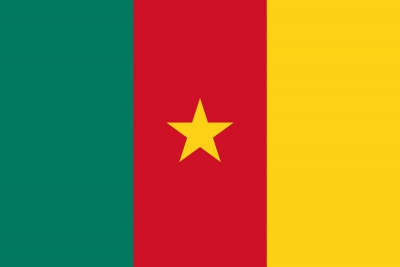Paul Biya (born Paul Barthlemy Biya'a bi Mvondo; 13 February 1933) is a Cameroonian politician who has served as the president of Cameroon since 6 November 1982. He is the second-longest-ruling president in Africa, the oldest head of state in Africa, and the longest-ruling non-royal leader in the world.
A native of Cameroon's south, Biya rose rapidly as a bureaucrat under President Ahmadou Ahidjo in the 1960s, serving as Secretary-General of the Presidency from 1968 to 1975 and then Prime Minister of Cameroon from 1975 to 1982. He succeeded Ahidjo as president upon the latter's surprise resignation in 1982 and consolidated power in a 19831984 staged attempted coup in which he eliminated all of his major rivals.Biya introduced political reforms within the context of a one-party system in the 1980s, later accepting the introduction of multiparty politics in the early 1990s under serious pressure. He won the contentious 1992 presidential election with 40% of the plural, single-ballot vote and was re-elected by large margins in 1997, 2004, 2011 and 2018. Opposition politicians and Western governments have alleged voting irregularities and fraud on each of these occasions. Many independent sources have provided evidence that he did not win the elections in 1992 and that subsequent elections suffered from rampant fraud.His regime is supported by France, the former colonial power in Cameroon, which supplies it with weapons and trains its military forces. France is also the leading foreign investor in Cameroon, ahead of the United States.
Cameroon ( (listen), French: Cameroun), officially the Republic of Cameroon (French: République du Cameroun), is a country in west-central Africa. It is bordered by Nigeria to the west and north; Chad to the northeast; the Central African Republic to the east; and Equatorial Guinea, Gabon and the Republic of the Congo to the south. Its coastline lies on the Bight of Biafra, part of the Gulf of Guinea and the Atlantic Ocean. The country is sometimes identified as West African and other times as Central African, due to its strategic position at the crossroads between West and Central Africa. Its nearly 25 million people speak 250 native languages.Early inhabitants of the territory included the Sao civilisation around Lake Chad, and the Baka hunter-gatherers in the southeastern rainforest. Portuguese explorers reached the coast in the 15th century and named the area Rio dos Camarões (Shrimp River), which became Cameroon in English. Fulani soldiers founded the Adamawa Emirate in the north in the 19th century, and various ethnic groups of the west and northwest established powerful chiefdoms and fondoms. Cameroon became a German colony in 1884 known as Kamerun. After World War I, it was divided between France and the United Kingdom as League of Nations mandates. The Union des Populations du Cameroun (UPC) political party advocated independence, but was outlawed by France in the 1950s, leading to the national liberation insurgency fought between French and UPC militant forces until early 1971. In 1960, the French-administered part of Cameroon became independent, as the Republic of Cameroun, under President Ahmadou Ahidjo. The southern part of British Cameroons federated with it in 1961 to form the Federal Republic of Cameroon. The federation was abandoned in 1972. The country was renamed the United Republic of Cameroon in 1972 and the Republic of Cameroon in 1984. Paul Biya, the incumbent president, has led the country since 1982 following Ahidjo's resignation; he previously held office as prime minister from 1975 on. Cameroon is governed as a unitary presidential republic.
The official languages of Cameroon are French and English, the official languages of former French Cameroons and British Cameroons. Its religious population is predominantly Christian, with a significant minority practicing Islam, and others following traditional faiths. It has experienced tensions from the English-speaking territories, where politicians have advocated for greater decentralisation and even complete separation or independence (as in the Southern Cameroons National Council). In 2017, tensions over the creation of an Ambazonian state in the English-speaking territories escalated into open warfare.
Large numbers of Cameroonians live as subsistence farmers. The country is often referred to as "Africa in miniature" for its geological, linguistic and cultural diversity. Its natural features include beaches, deserts, mountains, rainforests, and savannas. Its highest point, at almost 4,100 metres (13,500 ft), is Mount Cameroon in the Southwest Region. Its cities with largest populations are Douala on the Wouri River, its economic capital and main seaport; Yaoundé, its political capital; and Garoua. Cameroon is well known for its native music styles, particularly Makossa and Bikutsi, and for its successful national football team. It is a member state of the African Union, the United Nations, the Organisation Internationale de la Francophonie (OIF), the Commonwealth of Nations, Non-Aligned Movement and the Organisation of Islamic Cooperation.

1984Apr, 6
Members of Cameroon's Republican Guard unsuccessfully attempt to overthrow the government headed by Paul Biya.
Choose Another Date
Events on 1984
- 7Jan
Association of Southeast Asian Nations
Brunei becomes the sixth member of the Association of Southeast Asian Nations (ASEAN). - 5Jun
Indira Gandhi
The Prime Minister of India, Indira Gandhi, orders an attack on the Golden Temple, the holiest site of the Sikh religion. - 4Aug
Burkina Faso
The Republic of Upper Volta changes its name to Burkina Faso. - 20Sep
Beirut
A suicide bomber in a car attacks the U.S. embassy in Beirut, Lebanon, killing twenty-two people. - 26Sep
Transfer of sovereignty over Hong Kong
The United Kingdom and China agree to a transfer of sovereignty over Hong Kong, to take place in 1997.

 English
English  español
español  français
français  português
português  русский
русский  العربية
العربية  简体中文
简体中文 